Day 6 - Egypt - Bagawat Necropolis & Hibis Temple
Day 6 - Bagawat Necropolis & Hibis Temple
Our last day in the desert has started.
At a desert lake near Dachla, we sit comfortably for the last time around the campfire.
We thankfully refuse the boat trip on the lake, because a cold, uncomfortable wind is blowing here. The place at the lake belongs to a newly built hotel complex, the "Magic Springs", which belongs to our friends, the tour operators Rahala. We are one of the first to visit the hotel complex and the rooms, all of which are beautifully equipped, so you can really relax. Opening is scheduled for next year.
Since it is currently very "European autumn weather" outdoors, we relocate our cozy get-together in the entrance hall of the Magic Springs.
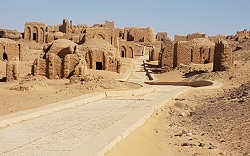
But our tour is not over yet and we continue our journey with our friends.
We pass the oasis town of Charga, like tens of thousands of people a long time ago. At that time they brought gold, ivory and slaves from Sudan to Egypt on this route. But we are interested in one of the oldest Christian cemeteries in the world. Near Charga is the Bagawat necropolis from the 2nd - 7th centuries AD. From a distance it appears like a ghostly ghost town.

Many Christians fled to the desert from persecution or were exiled here. 263 grave chapels and a church were built here from adobe. The grave chapels are partly provided with a dome made of adobe bricks and built either square or rectangular. There was a time when the bodies were embalmed and buried in a hole inside the graves. In some chapels we also find very well preserved frescoes with colorful pictures from the Bible.
Unforgettable stories that the Bible still tells us today. Adam and Eve, Noah with the ark, Daniel in the lion's den and many more.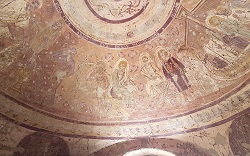
Another small highlight in the El-Charga valley, in the Libyan desert, is the Hibis temple.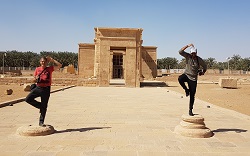 It is a 19 x 44 m long sandstone temple, the Temple of Hibis, which is dedicated to the god Amun.
It is a 19 x 44 m long sandstone temple, the Temple of Hibis, which is dedicated to the god Amun.
A small Sphingen Allee leads through several gates to the pillared hall, which is still adorned today with partly colored frescoes and pictures from the Pharaonic period carved in stone. Here we also meet an Egyptian school class for which we are the attraction. Everyone wants to take a photo with us. In the end we have a souvenir picture with the whole group.
But now last sprint!
It is time to say goodbye to Eslam and Mohamed, who greeted us so warmly and proudly showed us their Egypt. Thank you - Shukraan!
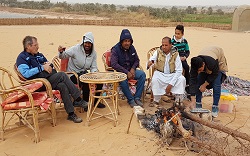
Amr, Dietmar and I have about 7 1/2 hours of driving left. After about 3 hours of driving in the desert, we struggle through the traffic of Assuit on the Nile and are glad that we will soon leave this city behind. Already it goes into the next desert - the varied stone desert of Egypt.
We are moving forward quickly on the well-developed desert road. Past endless expanses, harmoniously colored hills, round stones that look like dinosaurs, and mountains that extend a few hundred meters vertically. So impressive and beautiful!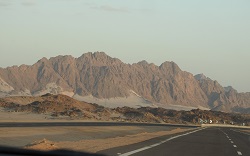
At Safaga we reach the Red Sea and the "tourist civilization" again. Along the sea it is an hour from south to north to Hurghada, our starting point.
It was a unique adventure that sometimes reminded us of Laurence from Arabia.
The desert is not just sand, sand, sand. The desert is varied and beautiful, mysterious and respectful, dangerous and paradisiacal at the same time.
The desert is worth seeing !!!
Oh yes, there is still something to tell:
Since we, Dietmar, Amr and I, had been on our own for a large part of the tour for the past few days, we were constantly checked by the police or military. ID check, where are you from - where are you going - why. The checkpoints communicated with each other so that they actually always knew where we were.
For their sake, I don't think for our safety, we had to sign several times that we are on the way at our own risk and do not like police or military escorts. In the necropolis of Bagawat and in the Hibis temple we couldn't avert an armed police escort.
The last 400 km rang Amr's cell phone every 15 minutes. Is everything OK? Where are you? How long do you need to go to the sea? In which hotel do you stay in Hurghada?
It was always a different one of the checkpoints that looked after our well-being, although there was never any assault in this part of the desert and it is really peaceful.
Tourism is the main source of income for the people of Egypt, which is why the government is careful to ensure that there are no dangers for tourists.
The armed police, also in Hurghada, shouldn't deter us. You are here for our protection and security!
Thanks to our friends Amr, Eslam, Mohamed and Yasser for giving us the opportunity to experience this desert adventure.
The Rahala Company with our friend Eslam (Eslam Safari Safari) is the perfect contact for guided desert tours. They are at home here, they know your way around!
You can contact them at: facebook, by "Eslam Safari Safari".

